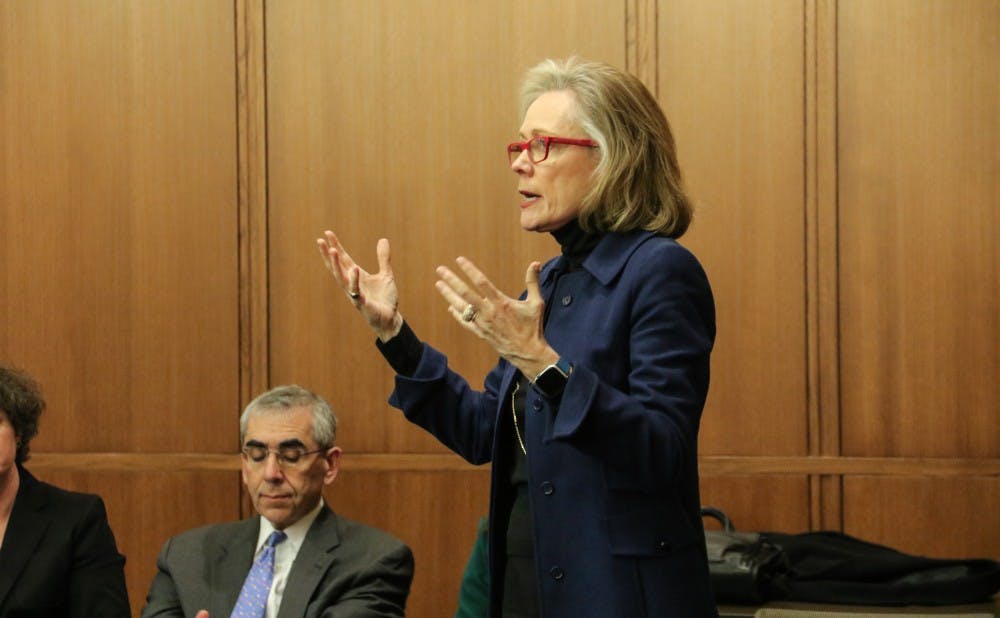The Board of Trustees hosted its first-ever open forum Wednesday as part of its new transparency initiatives.
Richard Riddell, senior vice president and secretary to the Board of Trustees, moderated the forum that allowed members of the Duke community to ask questions about the Board's standing committees and task forces.
The panel consisted of a mix of faculty, administration, a Ph.D. student and one Trustee—Patricia Morton, Trinity ‘77. Don Taylor, chair of the Academic Council and professor in the Sanford School of Public Policy, and Michael Schoenfeld, vice president for government affairs and public relations, also fielded questions.
Is Duke rich or struggling?
Included in the summary of the Future of Central Campus Task Force's meeting was a brief assessment of the University's financial situation: "The university is in a sound financial position, with some pressure from our aspirations and strategic priorities."
One questioner asked how Duke could offer a positive outlook on the University’s finances when administration announced last semester that it would stop paying for healthcare for some students on financial aid. President Vincent Price later walked back that decision in part due to student backlash.
“Duke, financially, is a decentralized environment," Riddell said.
This means that although Duke is overall in a strong financial position, some parts—such as undergraduate financial aid—are working on a deficit.
He explained that most funding goes straight to the University's different schools, and financial aid falls in a different bucket. Since Duke practices need-blind admissions, he said, there can be no set financial aid budget from year to year. Thus, if there isn’t enough money for financial aid in a particular year from endowments, it has to come from the strategic or operating budget. Because there is not enough endowed funding for the office, it runs at a deficit.
Schoenfeld noted that the University would be irresponsible not to explore all options to maximize financial resources. He said Duke has to balance the ambition “to do everything” with reality.
“We have an amount of money that would be the envy of all but seven or eight universities in the world,” Taylor added. “The problem is that we envy the spending rate of the top two or three universities.”
Koch Family Scoreboard: How much influence do donors have?
As another part of the transparency initiatives, Riddell released a summary of each committee’s recent actions with redactions. But he accidentally did not redact a section of the Resources Committee's summary that announced a new scoreboard will be named after the Koch family.
An audience member asked if the Kochs' money came with any strings attached, particularly related to influencing professor hires or research focus. Riddell emphasized that there were ethical boundaries the Board follows when accepting donations and when naming a new structure after a donor.
“The Koch family likes Duke baseball—they like the coach in particular. They wanted to give money, and they gave money for the scoreboard,” he said. “The only string attached is the scoreboard has to go up and their name has to be on it.”
Schoenfeld followed up by saying that Duke has strict rules about the influence a donor can have over the University’s operations.
“The University would never be in the position of selling its academic integrity for a particular gift,” he said.
Increasing diversity on the Board of Trustees
A question was asked early on about the purpose of a “pipeline diversity” ad-hoc subcommittee, which was endorsed by the Board's governance committee at the last meeting. Morton said the ad-hoc committee was designed to increase diversity in the Board of Trustees with a focus on race, “cultural contingencies” and gender.
Riddell said that 90 percent of Trustees were once on a Board of Visitors at the University, so increasing diversity on those boards was one of the committee's top priorities. He also noted that a large number are alumni.
Morton said that members of Duke's Board, like other boards, "regularly" turnover, so Trustees have to be forward-thinking in preparing candidates to serve in the future.
"We wanted to be very proactive about candidates we could bring into the pipeline," she said.
Correction: This article was updated Thursday afternoon to reflect that Morton said the Trustees "regularly" turn over, instead of the Board having a high turnover rate. The Chronicle regrets the error.
Get The Chronicle straight to your inbox
Signup for our weekly newsletter. Cancel at any time.

Jake Satisky was the Editor-in-Chief for Volume 115 of The Chronicle.

